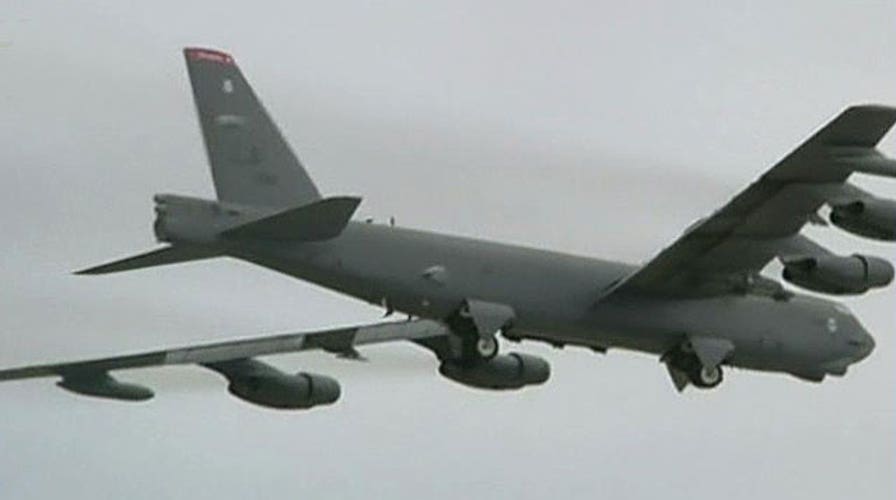The State Department said Wednesday it is advising U.S. airlines to take necessary steps to operate safely in China's newly declared air defense zone in the East China Sea, a day after two American B-52 bombers flew through the contested airspace.
State Department spokeswoman Jen Psaki told reporters at a daily press briefing that the U.S. is attempting to determine whether China's new air defense zone rule requiring foreign aircraft to identify themselves applies to commercial airlines, Reuters reported.
"In the meantime, U.S. air carriers are being advised to take all steps they consider necessary to operate safely in the East China Sea region," Psaki said.
China acknowledged Wednesday it let two American B-52 bombers fly unhindered through the air defense zone, raising questions about Beijing's determination to enforce its requirement that foreign aircraft identify themselves and accept Chinese instructions.
China's lack of any action suggested that it was merely playing out a diplomatic game to establish ownership over the area rather than provoke an international incident.
The flights followed days of angry rhetoric and accusations over Beijing's move, designed to assert Chinese claims to a group of uninhabited islands controlled by Japan.
The U.S. and Japan have said they don't acknowledge the zone, and Taiwan and South Korea, both close to the U.S., also rejected it.
Psaki indicated U.S. airlines were not being advised to inform Chinese officials of their flight plans. She said China's move appeared to be an attempt to change the status quo in the East China Sea.
"This will raise regional tensions and increase the risk of miscalculation, confrontation and accidents," she told reporters.
The U.S., which has hundreds of military aircraft based in the region, described Tuesday's flights as a training mission unrelated to China's announcement of the zone. U.S. officials said the two unarmed B-52 bombers took off from their home base in Guam around midday and were in the zone that encompasses the disputed islands for less than an hour before returning to their base, adding the aircraft encountered no problems.
Australia, meanwhile, said it called in the Chinese ambassador to express concern about the sudden zone declaration.
"The timing and the manner of China's announcement are unhelpful in light of current regional tensions, and will not contribute to regional stability," Australian Foreign Minister Julie Bishop said in a statement.
Beijing's move fits a pattern of putting teeth behind its territorial claims and is seen as potentially leading to dangerous encounters depending on how vigorously China enforces it — and how cautious it is when intercepting aircraft from Japan, the U.S. and other countries.
Chinese reaction to the U.S. bomber flights was predictably angry, with some recalling the 2001 collision between a Chinese fighter and a U.S. surveillance plane in international airspace off China's southeastern coast — the kind of accident some fear China's new policy could make more likely. The Chinese pilot, Wang Wei, was killed in the crash and the U.S. crew forced to make a landing on China's Hainan island, where they were held for 10 days and repeatedly interrogated before being released.
"Let's not repeat the humiliation of Wang Wei. Make good preparations to counterattack," wrote Zheng Daojin, a reporter with the official Xinhua News Agency on his Twitter-like Weibo microblog.
Businessman Li Pengliang said the island dispute had heightened anti-Japanese sentiment, but doubted the chances of an open conflict.
"The public is outraged, but I still believe that the leaders in power are sober minded. They will not act on impulse," Li said.
The Associated Press and Reuters contributed to this report.

